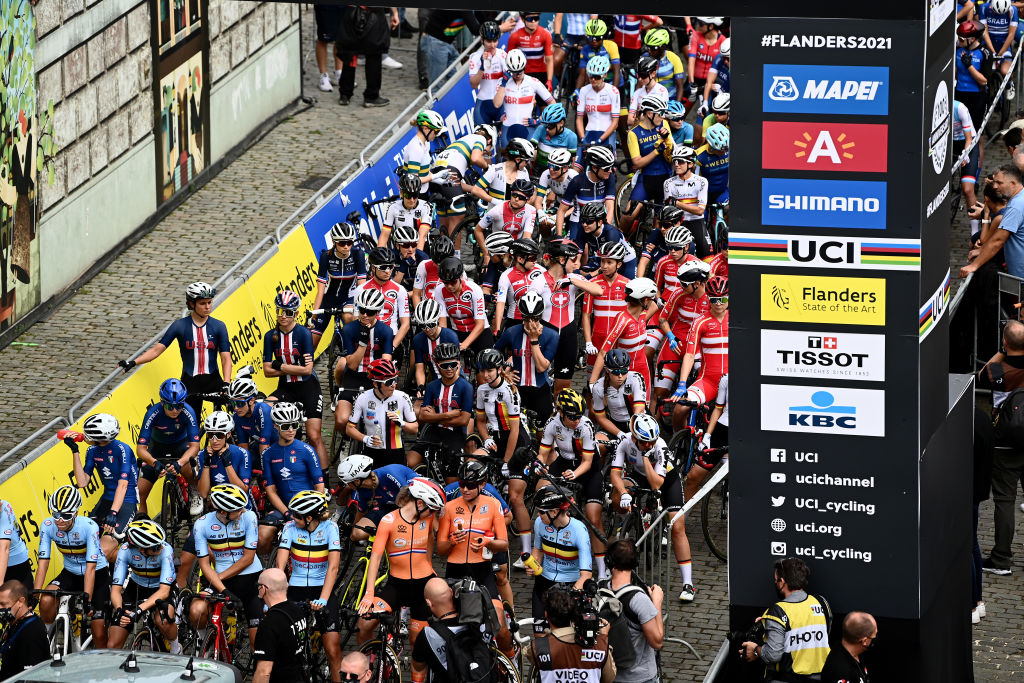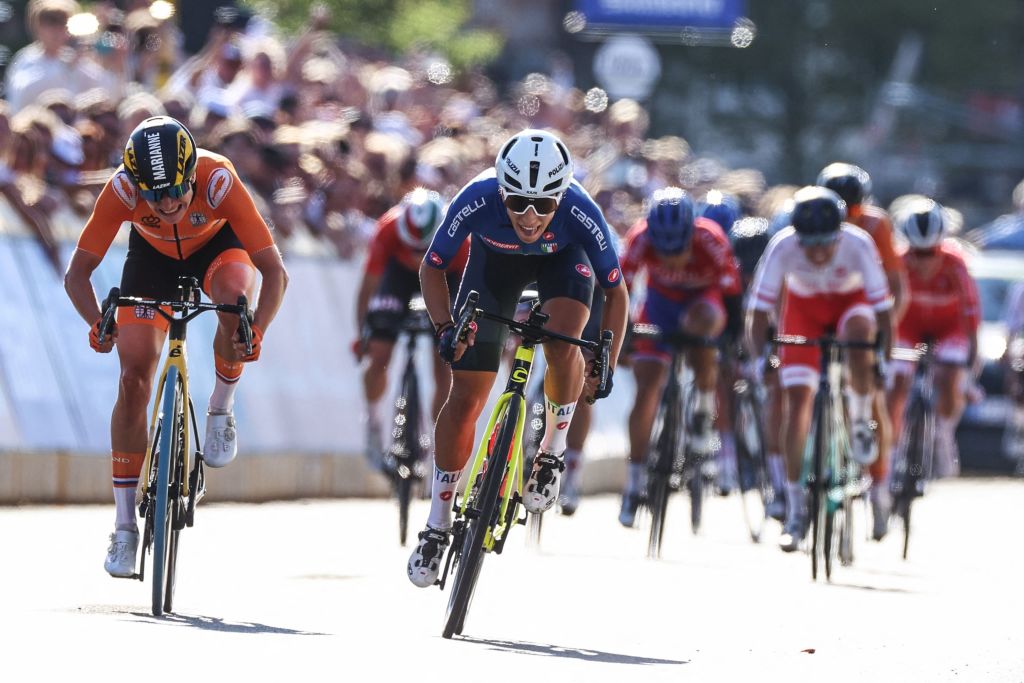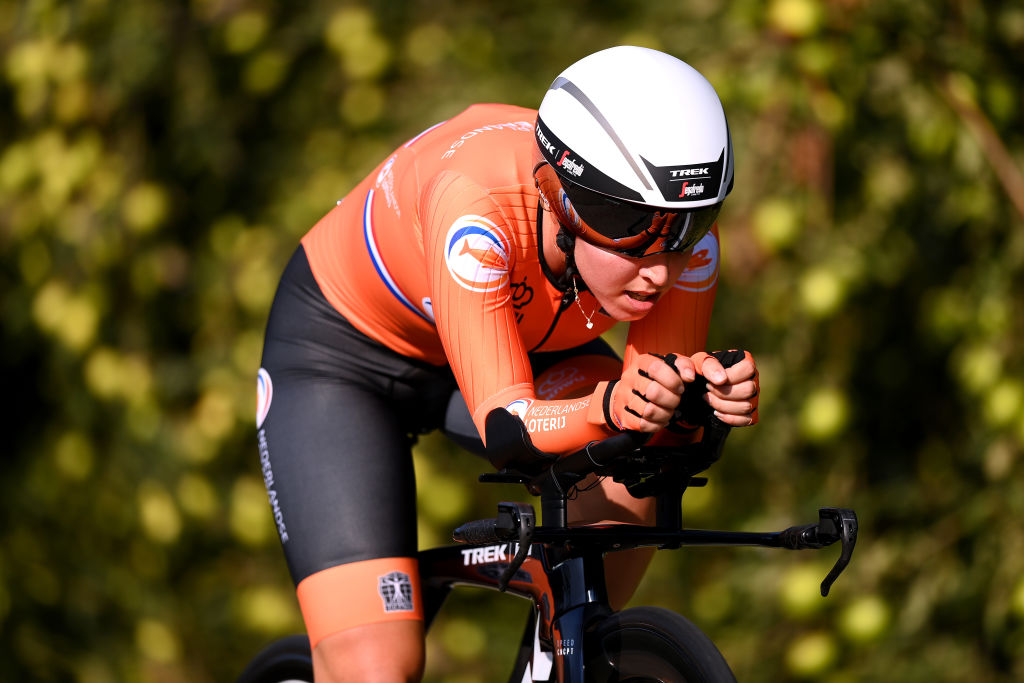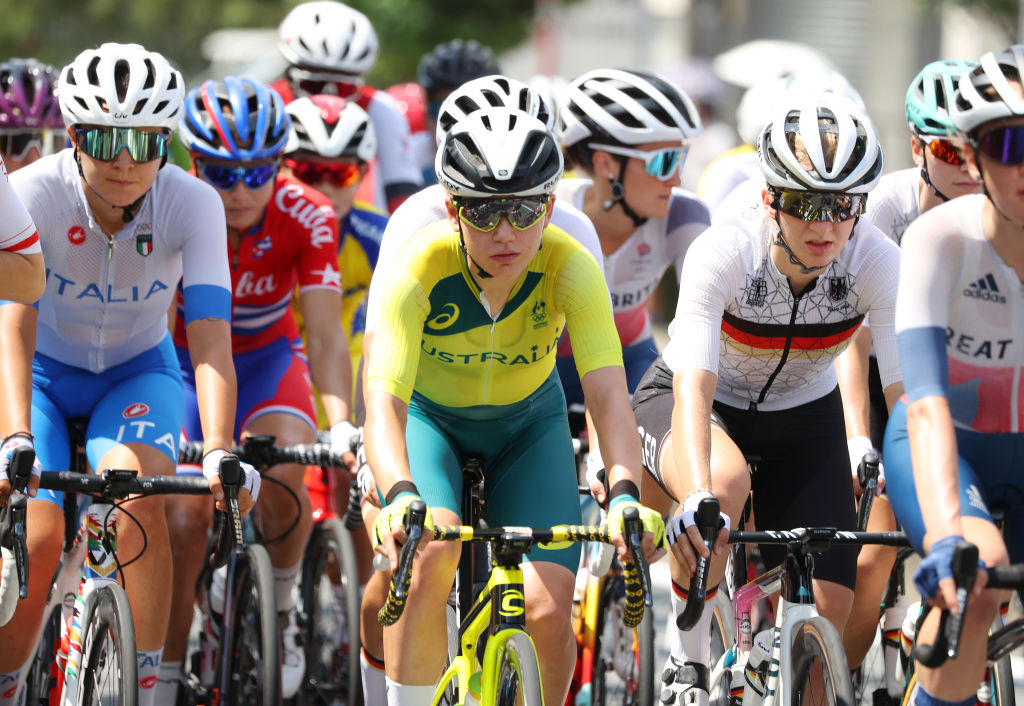A winner with no race – The enigmatic new women's U23 category at the World Championships
The logistics, dynamics, and talking points of a combined U23-elite women's event that many view as a missed opportunity

For the first time in the UCI Road World Championships history, under-23 women will compete for world titles as part of combined events held within the elite women's time trial and road race in Wollongong, Australia.
While the sport's governing body hails the addition of the two new rainbow jerseys as a step toward parity, others view it as a missed opportunity to go the total distance and offer a standalone time trial and road race for the under-23 women's category.
Mountain biking and cyclo-cross disciplines have paved the way for young female athletes with an under-23 women's category and world titles available at the World Championships. However, road racing has lagged by not creating a standalone category for its young female riders exiting the junior ranks at age 18.
Until this year, the UCI had not offered specified road race and time trial categories, world titles, or gold medals for under-23 women, a category that was introduced for the under-23 men in 1996. Nor does it provide an under-23 women's category of events on its national calendar, as it does an under-23 men's category.
In a wide-ranging feature published ahead of the World Championships in 2021, Cyclingnews examined the importance of adding a standalone under-23 women's category to the Worlds schedule and highlighted the need to create a bridge for riders to develop during their formative years between racing ages 19-22.
We also considered how excluding this category for women from the World Championships and Nations Cup could result in a loss of visibility, reducing the potential for funding, contracts, development and opportunity, and how it has led to athletes quitting the sport.
The UCI later announced that the first-ever under-23 women's time trial and road race world champions would be crowned at the Wollongong Worlds. However, in what some deem a controversial move, there would be no standalone races for the category.
Get The Leadout Newsletter
The latest race content, interviews, features, reviews and expert buying guides, direct to your inbox!
UCI President David Lappartient defended the introduction of combined elite and under-23 events, noting it as the first step in what he referred to as a 'transition measure' toward eventually creating dedicated under-23 women's categories in 2025.
The plans attracted widespread criticism from within the women's peloton, with Australia's Sarah Gigante, 21, saying that combining the elite and under-23 women's events was "completely unfair."
In addition, New Zealand's Niamh Fisher-Black, 22, questioned the logic of the race within a race format. "If you're going to have a title for under-23, give us our own race. It's a completely different dynamic. The point of this sport is to cross the line first, not finish somewhere in the bunch and get rewarded for it. That's not why I race. Come back when you can give us a proper race."
However, Lappartient and UCI director of Sports Peter Van den Abeele cited logistical concerns of a 'busy schedule' for the Wollongong organisers and cost concerns for the national federations travelling to Australia if it added two new standalone categories on such short notice.
One event, two rainbow jerseys

The under-23 women's categories aren't listed on the official event schedule in UCI technical guide for the Wollongong Worlds. However, participating riders who are 19-22 years old - born between 2000 and 2003 – racing inside the elite women's time trial on September 18 and road race on September 24 will be competing for the available under-23 world titles.
The UCI will award the top-placed under-23 women in the elite women's time trial and road race with the world champion's jerseys.
The prize money scale for the under-23 women's top-3 places in the time trial and road race will match that of the under-23 men's prize scale. There will be a total of €7,000 purse for each event, with the winners earning €4,000, second place at €2,000 and third place at €1,000.
Points acquired by under-23 riders competing will be awarded based on their position in the event classification according to the elite women's points scale.
The time trial and road race winners will secure the elite women's world title. The first under-23 rider to cross the finish line in the road race and the fastest under-23 finisher in the time trial will become the under-23 women's world champions.
However, if the first rider to cross the finish line in the road race and the fastest overall finisher in the time trial is between the ages of 19-22, she will win both the elite and the under-23 women's world titles.
Quotas, priorities and race dynamics
Team quotas, the selection process and the priorities that the national federations place on the elite world titles have added to the controversy of hosting combined elite and under-23 women's events, in addition to the confusing tactics that could play out on the road during a race within a race.
The UCI added under-23 world titles this year, but it didn't increase the quotas for the national federations to bring additional under-23 athletes. It also didn't enforce dedicated spots for under-23 riders on national teams that would guarantee their participation at the Worlds.
Australia released its selection for a home World Championships that did not include any under-23 women riders. Like many other nations, the priority is on the elite women's world title, so under-23 riders will not gain more opportunities to compete at the Worlds.
Road coordinator Rory Sutherland felt the under-23 women deserved a standalone race this year and that a lack of a separate quota for under-23 riders and a combined-category format hampered selections for the home nation. Tactics-wise, he said the race-within-a-race format splits the event in two and discourages team unity.
"When you look at the big picture, you want to go for everything. But at the same time ... Does it affect the main goal of winning the elite women's road race?"
Sutherland questioned the UCI's decision to combine the two events and the confusing on-road tactics it could create.
"It does complicate things when there are no more quotas. And then you're just getting to the finish line, and you have to figure out, 'okay, is this under-23 rider in front of the other one, or where was this athlete?'. How do you do that in a team situation?
"That is really complicated when you're trying to win the race as a whole. It's like splitting your objectives within a race."

Furthermore, National Federations have their unique selection process for the World Championships. Some nations base decisions purely on a coach's selection. Others follow a specific set of criteria to determine what athletes qualify to be considered for the World Championships.
The Dutch Federation selected Shirin van Anrooij, 20; however, her priority is to support Annemiek van Vleuten and Marianne Vos for the elite women's world title. The national team acknowledged that Van Anrooij would also compete in the individual time trial, where she would be free to race for the under-23 world title.
"In the time trial, Shirin van Anrooij can score high in the under-23 category, but in the road race, I just looked at the strongest possible group, which we will definitely need in a race that is expected to be difficult to control," said national team coach Loes Gunnewijk.
Other nations have selected teams that split the focus into under-23 and elite women's world titles, to varying degrees, though it is unclear how team tactics will affect both categories within the one race.
British Cycling has selected four under-23 athletes to its six-rider team, including national champion Alice Towers, 19, Anna Shackley, 21, Pfeiffer Georgi, 21, and Elynor Backstedt, 20, making this team the out-right favourites for the title in the road race.
Canada has two contenders for the under-23 title with Simone Boilard, 22, and Magdeleine Vallières-Mill, 21. Boilard told Cyclingnews at the Tour de France Femmes that winning the rainbow jersey is a significant season target, especially as she will turn 23 next year and won't be eligible for the under-23 world title.
Some of the sport's top under-23 riders have chosen not to compete at this year's World Championships for various reasons, despite the world title available.
Blanka Vas, 21, of Hungry, opted to skip the event at the request of her trade team SD Worx due to the long journey and her focus on the upcoming cyclo-cross season.
Megan Jastrab, 20, would have been a contender for the under-23 title as part of the US team but declined a spot on the seven-rider team. "As far as the under-23 women's race, the race is within the elite women's race, therefore, the under-23 rider(s) has to be selected and qualify based on the elite women's selection criteria. Megan Jastrab was our best rider to take on the U23 role, but she ultimately decided that the course would not suit her," USA Cycling told Cyclingnews.
Limited opportunity
The UCI may have intended the combined elite and under-23 women's events as a step toward parity. However, it lacks any thoughtful or genuine opportunity, and it is certainly not an equal opportunity for the 19-22 years old women cohort to develop or to have a chance to excel against their peers.
There is even less opportunity when national federations aren't given additional rider quotas, and their selection priority is focused on the elite world title. Many of the selected young riders will be expected to race in support of their more developed elite teammates during a combined event. And racing dynamics could be a problem.
For these reasons, a survey by The Cyclists’ Alliance (TCA) last year concluded that an overwhelming majority of Women’s WorldTeam and Continental Team riders believe there should be a separate under-23 women's road race at the World Championships.
In fact, the survey found that not only do riders overwhelmingly support the creation of a standalone race, but many were also against the idea of an integrated under-23 championships: 42 per cent said an under-23 title should not be included in the elite race from 2022 even as an interim solution.
“Supporting a separate U23 women's category at World Championship level, as well as the introduction of U23 races within the season, is the next logical step in continuing the progress in elite women's cycling and creating an environment where young women can develop and thrive," Gracie Elvin, co-founder of The Cyclists’ Alliance said.

Earlier this year Lappartient estimated that roughly a third of the peloton during the combined elite and under-23 women's events would be 19-22 years old at the Wollongong Worlds. According to the time trial start list, 11 of the 45 riders in the women’s race against the clock fit into the U23 category – that’s just shy of a quarter of the field. The provisional start list also indicates that under-23 riders will make up roughly a quarter of the participants in the elite women’s road race.
Provisional start lists indicate that there will be 38 riders competing in the under-23 men's time trial and seven riders that are 19-22 opting to compete in the elite men's time trial. There will be 119 starters for the under-23 men's standalone road race, along with 11 riders between 19-22 opting to race in the elite men's road race.
Many hoped that a standalone under-23 women's time trial and road race, like the under-23 men's events, would be added to the multi-discipline 2023 Worlds in Glasgow, shifting up the outlined 2025 start. However, when the schedule was released, it did not include separate events, though the combined elite-under-23 road race will conclude the Championships on August 13.
Under-23 women, it seems, will indeed have to navigate the combined events with the elite women's category for the next three years. Lappartient said that he expects the opportunities for under-23 women to increase in future, particularly in anticipation of the introduction of dedicated events at the World Championships in 2025.

Kirsten Frattini is the Deputy Editor of Cyclingnews, overseeing the global racing content plan.
Kirsten has a background in Kinesiology and Health Science. She has been involved in cycling from the community and grassroots level to professional cycling's biggest races, reporting on the WorldTour, Spring Classics, Tours de France, World Championships and Olympic Games.
She began her sports journalism career with Cyclingnews as a North American Correspondent in 2006. In 2018, Kirsten became Women's Editor – overseeing the content strategy, race coverage and growth of women's professional cycling – before becoming Deputy Editor in 2023.